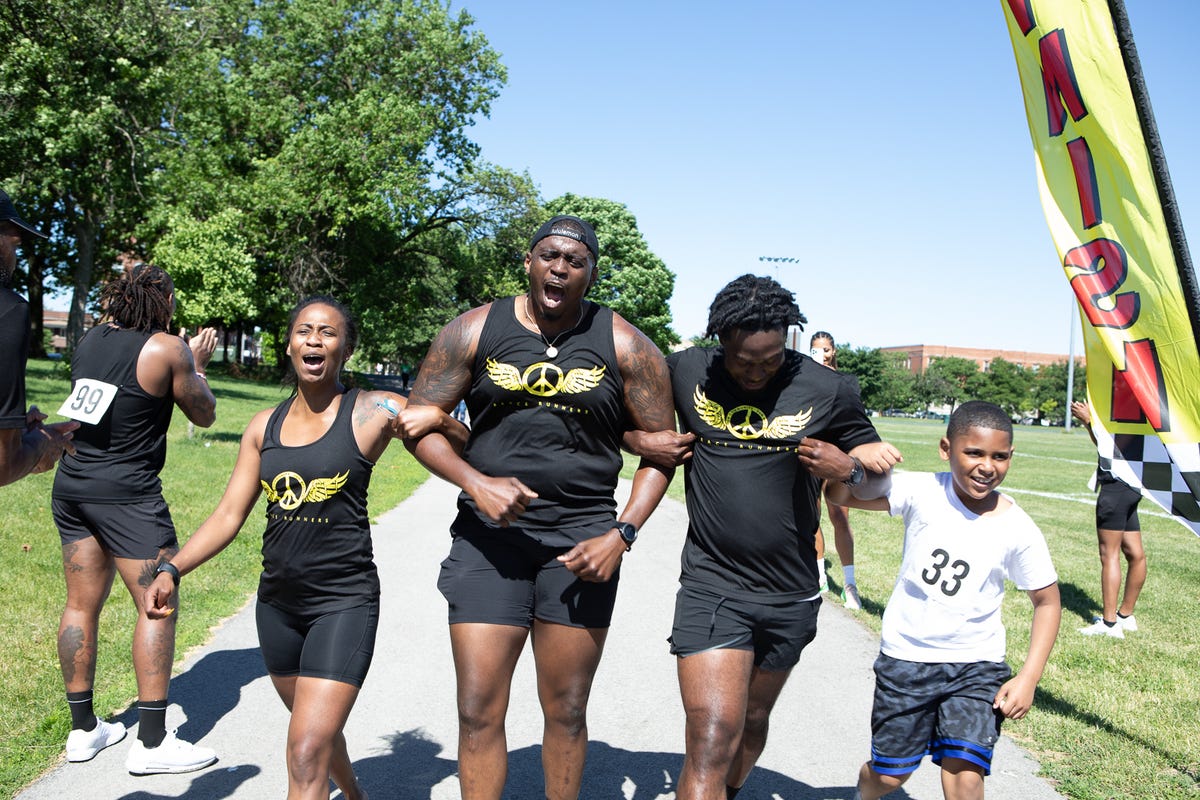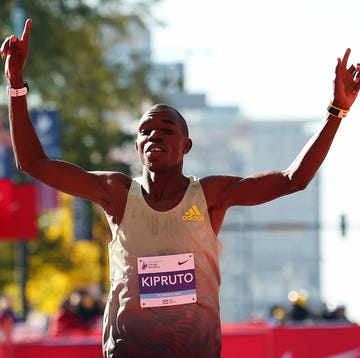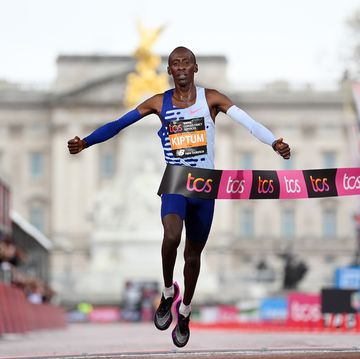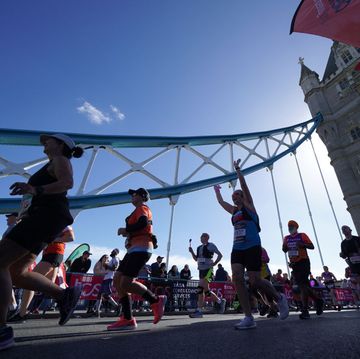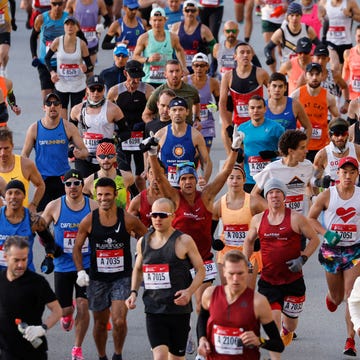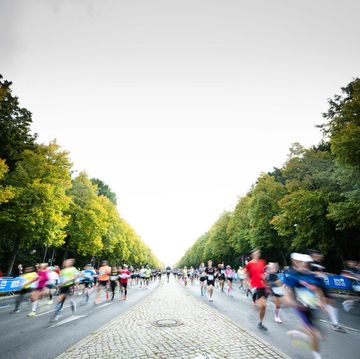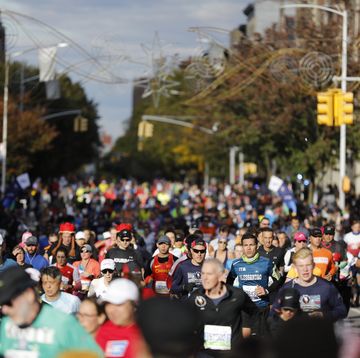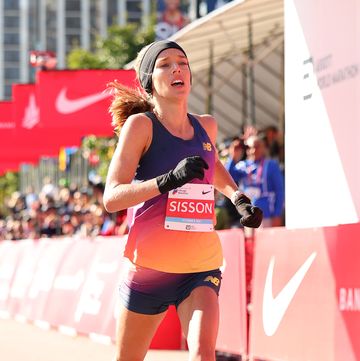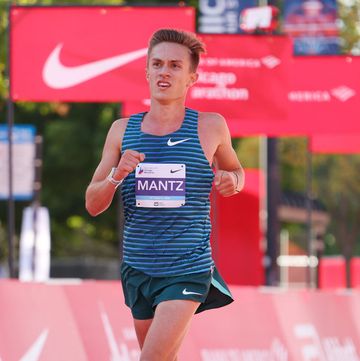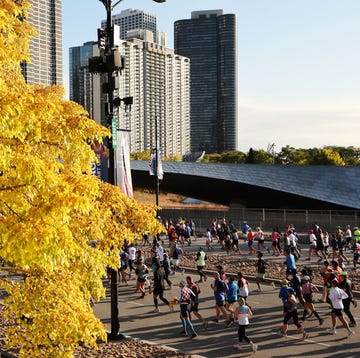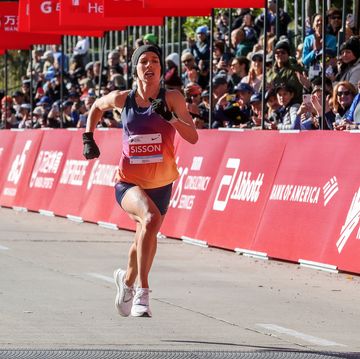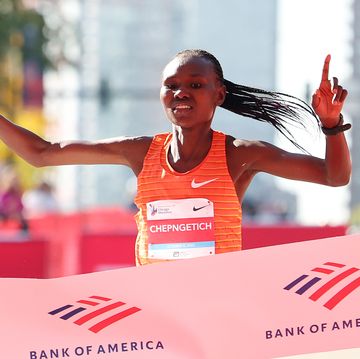Jackie Hoffman knows this about running: The sport can bridge gaps.
The one he cares about most is the rift in life expectancy between his Chicago neighborhood and other parts of the city. Residents of West Garfield Park survive an average age of 69 years, city data shows. Meanwhile, those on the Near North Side or downtown’s Loop can expect to see 85.
A running group can’t immediately solve all the underlying causes, including long-term disinvestment and inequities in education and healthcare access.
More From Runner's World

But week by week and mile by mile, Peace Runners 773—the running-focused non-profit of which Hoffman is founder and president—is proving a powerful catalyst for change, both for individuals and the bigger community.
“We can’t promise you a long life, but we can promise you a better quality of life,” Hoffman told Runner’s World. “The bigger the run club grows, the more people are healthy around this community.”
And he continues to stretch himself in the process. This Sunday, Hoffman will take on his longest run yet when he and 10 other Peace Runners, nearly all of them first-timers, line up at the Chicago Marathon.
As early as January, such a feat seemed unthinkable to the former offensive lineman, once far more focused on strength and power than endurance. But as a leader, Hoffman believes in setting an example—and bringing others up with him.
“This year is the year of stretch and taking myself to an uncomfortable place, because I feel like that is where the growth is,” he says. “I want people to grow and I want this community to grow, and I have to grow.”
From Football to 5Ks
As a child in West Garfield Park, Hoffman believed football was his destiny. He played at Curie High School and at the College of DuPage, then earned a scholarship to Bethune-Cookman University, an NCAA Division I, historically Black university in Daytona, Florida. There, he earned a bachelor’s degree in criminal justice.
He did a workout with the Chicago Bears, but wasn’t drafted, then briefly played in the Arena Football League. By that time, he’d started running more, and decided he’d rather move on than maintain a lineman’s bulky physique.
The choice was one of the hardest of his life, he said. But ultimately, he realized football had already given him tools to build a future—an education, a broader perspective, and discipline, applicable to any endeavor.
Hoffman began his law-enforcement career, eventually joining the police department in Atlanta. He wasn’t sure he’d come back home for more than a visit. But then his grandmother’s health failed, and he traveled back to say goodbye and comfort his parents.
En route, he did the math. Life expectancy was 69, and his mother Glydan Hoffman was 62. If he returned twice a year, he wouldn't have many more visits. So, he took a job with the Department of Homeland Security, and—with his wife Tiffany Hoffman, also a Chicago native—moved back to Garfield Park in spring of 2020.
As he did, he was struck all over again by the neighborhood’s enduring beauty—the 172-acre public park, the field house with a historic Gold Dome, the stunning botanical conservatory.
But he was also reminded of what it lacked. A grocery store, for one thing. Affordable gyms, or other safe spaces to exercise. And mental health resources, notable since Tiffany works as a licensed professional counselor.
On Juneteenth 2020—a day commemorating freedom from slavery—he drew on his passion for running to do something about it. A last-minute Instagram post about a 5K attracted a group of about two dozen people to Garfield Park. “From that moment, people were like, ‘We need more of this in this community. This was something positive, and I got outside my doors today and it was amazing,’” he said.
Spreading Health
Hoffman hoped to build on that momentum—but COVID-related restrictions on group gatherings interfered. Instead, he worked with Tiffany and his friend Dominique Clay, now the organization’s vice-president, to build up a structure. That included designing a logo—a peace sign with wings and 773, the neighborhood’s predominant area code—and filing paperwork to start a non-profit.
The name reflects both a focus on mental health and inner well-being, as well as a goal to reduce violence—another consequence of disinvestment and threat to longevity in the area. Runners visible on the street will help create a safe space, Hoffman believes, based on his experience both growing up in and policing underserved neighborhoods.
The next Juneteenth, Peace Runners 773 held another Juneteenth 5K, this time attracting 65 people to Garfield Park. One of them was Nicole Midderhoff, who grew up in nearby North Lawndale and ran track and cross-country in high school. After watching her mom pass away nine years ago of diabetes and kidney disease, Midderhoff kept up her running as an adult to stay healthy.
Though she now lives in nearby suburban Maywood, Midderhoff maintains city ties. She owns the building she grew up in, and her dad remains on the same block. Peace Runner’s proximity and community mission appealed to her, so she kept showing up and pitching in—setting up a website, buying supplies, raising funds, and coaching new runners through an eight-week couch to 5K program.
With help from committed members like Midderhoff, who’s now a team leader, Peace Runners has continued growing. Now, a lively group of around 30 meets every Saturday for a 2-mile run or 1-mile walk, followed by a HIIT workout. That includes a group of adults 60 and older—the Young at Hearts—who often meet to walk and socialize on other days, too.
Post-workout, the Peace Runners sit and talk in what Tiffany calls a “processing circle.” There, they share what’s on their minds, with her expert guidance—she’s careful to ask if people want feedback, just to vent, or a connection to mental health resources.
Sweating together breaks down barriers, and talking afterward helps participants realize they’re not alone in their struggles. “People always mention, ‘I came in here heavy, and now I feel lighter, as if a burden was lifted off my shoulders,” she said.
That isn’t the only sign of Peace Runners’ impact. Many people who’ve never run before have been encouraged to start, or dabblers to take on new distances. And many have seen health improvements as a result. Glydan, who Hoffman calls the “team mom,” recently went to the doctor to monitor her chronic health conditions. Doctors told her she could extend her follow-up visits from every two months to every six, thanks to her uptick in activity—one gap that’s better extended.
Building Bonds
Another gulf the group has helped narrow is the one between neighborhoods. Chicago is one of the country’s most diverse cities—and also among its most segregated. But Peace Runners is among a burgeoning number of community running groups working to change that, creating space for minorities and other often-excluded groups in the process.
Some—such as GumboFit and Venados on the south side, and 3Run2 and Viento on the West Side—have run together for years, even decades. Others are more recent—take Grocery Run Club, another non-profit that sprung out of literal food deliveries during lockdown, and Family Style Run Club, started this year with an emphasis on Asian-American runners.
Despite their unique identities, these groups—and leaders like Hoffman—frequently connect and collaborate. They’ll show up at each other’s weekly runs, cheer each other on at races, and co-host events. Peace Runners and Grocery Run Club, for example, will hold a joint pre-marathon shakeout run together Saturday morning.
“Knowing there are other individuals that are out there doing the same work that we are—the running world has created such a huge family, everywhere you go,” Tiffany Hoffman said. “It’s amazing.”
Many of the city’s groups came together at Chicago 13.1, a new half marathon launched this summer by the organizers of the Chicago Marathon. Unlike many races in the city, which take place downtown or along the Chicago Lakefront Trail, the event ran down the streets and boulevards of the city’s West Side—starting and finishing in Garfield Park itself.
Not only did the race mark Hoffman’s first half marathon, it also felt like a celebration of all he’d worked for. Athletes from all over the city came to his backyard; neighbors he’d grown up with peered out their windows or at the sound of footsteps and cowbells. At mile 6, Hoffman gave Glydan a kiss, and cried. “It was something that I compared to a wedding-day feeling,” he said. “Everybody was there, and it was beautiful.”
Past the Finish Line
The year has brought even more high moments for Peace Runners and its leader. On Juneteenth this year, the group’s now-annual 5K drew more than 130 participants. Hoffman was named an ambassador for both the Chicago Marathon and Lululemon, as well as among the inaugural class of Community Leadership Fellows, which aims to cultivate Black and brown leaders on the city’s West Side.
At times, the work—and the attention—feels slightly overwhelming to Hoffman, on top of his full-time job. When that happens, he turns to his team, and reminds himself of his mission and who he represents. “Everybody gets to these points where things are getting hard for the better,” he said. “I just gotta lean into it, for the betterment of the community.”
Peace Runners are using the incoming resources to add youth programs to their schedule, and expanding to hold 5Ks in nearby neighborhoods like North Lawndale and Austin. They’re already laying groundwork for next year’s Juneteenth 5K, aiming to close streets and draw even more participants.
And in the long run, they’re dreaming even bigger. Years down the line, Hoffman can see a brand-new facility with many features to benefit neighbors: an indoor track to make running safer in the winter, an affordable and convenient gym that’s not intimidating, and a space for Tiffany to start a private practice, offering low-cost mental health services. Outside, gardens would provide common space, along with fresh produce.
But first, he—and Tiffany, and Midderhoff, and eight of their teammates—have a marathon to run.
They’ve done their long runs together, either along neighborhood streets or the lakefront, bolstering each other up when they’re tired. They’ll see their friends from across the city, toeing the line next to them or cheering along the sidelines. And by mile 16, when the course winds through the West Side, they’ll know that other Peace Runners—including Glydan—will be there to provide added motivation.
They’ll get through this challenge just like they move through life—as a community. “Whenever I start to feel weak, or I feel like I can’t go, I go back to that purpose, and the 10 other Peace Runners depending on me,” Hoffman said. “I’m never alone.”

Cindy is a freelance health and fitness writer, author, and podcaster who’s contributed regularly to Runner’s World since 2013. She’s the coauthor of both Breakthrough Women’s Running: Dream Big and Train Smart and Rebound: Train Your Mind to Bounce Back Stronger from Sports Injuries, a book about the psychology of sports injury from Bloomsbury Sport. Cindy specializes in covering injury prevention and recovery, everyday athletes accomplishing extraordinary things, and the active community in her beloved Chicago, where winter forges deep bonds between those brave enough to train through it.
